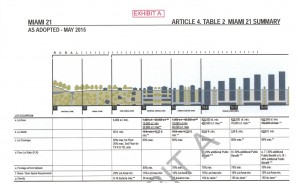A new amendment to the Miami 21 zoning code that could heavily affect small lot owners is headed for a final city commission vote Thursday, much to the surprise of some real estate brokers and developers.
The proposal, which already passed a first reading in October, would alter the minimum and maximum lot sizes for development throughout the city of Miami.
Some of the changes are dramatic: in the T4 and T5 urban zoning areas, which can be found in neighborhoods like Little Havana, Overtown and Allapattah, the minimum lot size to build a new structure would jump from as little as 1,200 square feet to a flat 10,000 square feet.
In denser areas that use the T6 zoning, like Brickell, the proposal would prevent development on lots smaller than 20,000 square feet. Before, the minimum was only 5,000 square feet.
Some brokers have already expressed worry over the proposal. Peter Andolina, an agent with Metro 1 who specializes in land sales, told The Real Deal that he’s working on several deals that could turn sour under the new code.
“It just seems like there has to be some kind of accommodation made for people that already own 5,000-square-foot lots,” he said. “ I haven’t been able to get a straight answer from anyone at the city on what all this is about.”
The ordinance was proposed by City Manager Daniel J. Alfonso, on behalf of the city of Miami, according to agenda documents. Its purpose, according to the application, is to “encourage appropriate development based on density and intensity regulations.”
Commissioner Francis Suarez told TRD that he will likely request a deferral at tomorrow’s meeting, which would push back a vote on the issue to the commission’s second meeting in January 2016.
Suarez said he’s been fielding similar concerns from real estate professionals who aren’t sure what the new code would mean.
“We don’t want to do anything that makes it harder for someone to build efficiently,” he said.
Arguably the proposal’s biggest impact would be to small lot owners, said developer Andrew Frey, who heads his own firm Tecela. Miami is mostly broken up into 5,000-square-foot lots, he said, and most lot owners are individuals that only own one parcel.
“Small property owners would be forced to get some kind of permission from the city,” Frey said, “or they would be forced to sell out to an assembler.”

